- Home
- Adele Griffin
Hannah, Divided
Hannah, Divided Read online
Hannah, Divided
Adele Griffin
For my aunt, Elizabeth Sands
CONTENTS
PART ONE
1. The City Visitor
2. “Hark! ah, the Nightingale—”
3. Running, Counting, Stacking
4. Late
5. Evening Surprise
6. Coffee or Tobacco
7. Jumping, Jumping
8. Cheese, Sardines, and Granddad McNaughton
9. The View from Bloom
PART TWO
10. Mudtown
11. Doll Face
12. No X, But Plenty Left Over
13. Meeting Mr. Barnaby
14. Too Long and Wrong
15. Proofs of Old Codgers
16. Saturday with Mae
17. Dinner at Delancey Place
18. The Voice of Ulysses
19. Blown Back
20. Aluminum City
21. Rittenhouse Willow
22. Baby Face Nelson
23. Abandoned
PART THREE
24. A Phone Call
25. Home Again
26. Hepp
27. The Heart of It
28. Please Yourself
29. Nobody’s Sweetheart
30. Wooden Kimono
31. Future Perfect
32. A Glass Wish
33. An Ottley Friend
34. 11
Author’s Note
A Personal History of Adele Griffin
PART ONE
1. THE CITY VISITOR
NEVER HAD BRINTONS BRIDGE School looked so presentable. Its floor had been swept, its windows and chalkboard washed, its standing globe dusted, and a jam jar of marigolds placed on the windowsill. Never had its students appeared so scrubbed, either. Miss Cascade had asked them to pay close attention to fingernails, necks, and ears. Even Elgin Winnicker’s cowlick was spit-flattened neat to the back of his head.
All this fuss in preparation for Mr. Sweet, who, according to Miss Cascade, “just might be the most influential gentleman, ever, to step through our door.”
Hannah Bennett turned the words over in her head. Most influential gentleman, ever. She pictured Mr. Sweet as a combination of Moses and Charles Darwin. Only, Mr. Sweet was not traveling from Egypt or the Galapagos, but from Philadelphia, and he was coming to give their school money. Perhaps. Miss Cascade had read his letter out loud, the one he had written in response to Miss Cascade’s request for aid from the Wexler Foundation, the charitable trust for which Mr. Sweet worked. Mr. Sweet’s answer had been not quite yes but not quite no. Perhaps, he had written.
That was why their schoolhouse looked sharp as a needle today. To help push Mr. Sweet’s answer away from perhaps and closer to yes.
Miss Cascade looked up from her desk to waggle a finger at her students. “Class, we must remember politeness,” she said. “Everyone knows that our school needs a new roof and modern textbooks. Politeness counts.” Her eyes darted to Hannah, who often forgot about politeness.
Hannah lifted her chin and straightened. She had been helping the fifth graders with their long-division problems. She had been good all day and would continue to be so. She would not vex and disappoint.
Peggy Stone pulled at Hannah’s sleeve. “Hannah, my answer turned out to be not enough numbers.”
“Because you forgot the decimal point, Peggy.” Hannah picked up the pencil and dotted it in. “Five point one and point five one are different amounts when you—”
Her concentration broke with the faint sound of a car’s engine, gurgling and chugging down Brintons Bridge Road. Was that a motorcar? But nobody arrived at school by car! She leaped out of her seat and ran to the window.
“He’s here! It’s Mr. Sweet from Philadelphia!”
“Hannah! Sit down!”
“Lookatit, lookit his automobile! Brand spanking new! That’s a swell lot of money, I’ll say!
Books banged to the floor as students jumped from benches to cram into the schoolhouse’s open doorway. The polite, pent-up waiting of the afternoon was broken.
“A Super Eight Packard Touring,” breathed Elgin, who was nuts for automobiles and could name every model. “Musta just rolled out of big Bay City!”
“Could be quite a chunk of money sunk in that Wexler fund, if Mr. Sweet can arrive in such style,” said Betsy Seal.
“Girls, boys!” implored Miss Cascade. “Hannah!”
But once on her feet, Hannah could hardly bring herself to sit down again. The banana-yellow Packard veered off the road, stirring up a riot of dust, and charged the narrower graveled footpath to the school’s front door, where it hiccuped to a stop. Its engine gurgled and cut, and the driver’s-side door jerked open on oiled hinges. Hannah stared as one two-toned shoe, then another, planted itself to the ground. How peculiar—Mr. Sweet wore ladies’ shoes! Then the rest of a strong, stout woman emerged.
“Miss Cascade?” The woman’s voice was a bellow.
“Yes! Yes, I am! And you—?”
“Mrs. Theodora Ann Sweet!” the woman announced. “From the Wexler Foundation of Philadelphia! My friends call me Teddy. So may you!” She offered the favor grandly.
“Mrs.!—Teddy—Sweet!” Miss Cascade disguised her surprise with a friendly smile. “Please, madam, won’t you come in? By your name, I mistakenly thought …”
Mrs. Sweet was not listening. She palmed shut the car door as if she were closing a vault. Then she used her handkerchief to spit and rub at a smudge on the side window. “Mitts off my baby!” she ordered as she faced them. “She’s only three months old!”
Ignoring Miss Cascade’s offered hand, she barreled up the short flight of stone steps to the schoolhouse. Students parted at the door to give her way. A fearsome woman, Hannah thought, but so smartly dressed, in a gray suit cut thick as a slipcover, and matching tipped beret over her dark, bronze-rinsed hair. A silk sprig of lilac drooped sideways from her lapel, and an envelope bag fell slantwise from one broad shoulder.
Hannah counted seven suit buttons, eleven footsteps, and five syllables in her name. From bag to beret, Theodora Sweet seemed to be an odd-numbered, slant-sided sort of person.
Miss Cascade shooed boys and girls back to their seats while Mrs. Sweet’s gaze skipped across the room for a chair. Finding none, she scooted herself up onto the dunce stool, which caused a surge of giggling. Miss Cascade frowned the room into quiet.
Unconcerned, Mrs. Sweet pulled a clipboard and pen from her envelope bag. “Even for backwoods Chadds Ford farmland, this school is teensy-weensy! How many are you?”
“I teach fifty-six students.” Miss Cascade stood in front of her desk, her politeness smile now stretched into place. “Some of our older boys have left to work their family farms for the harvest. We’ll get them in school again before the first frost.”
“What bad form, to interrupt schooling with farming.” Mrs. Sweet scribbled on her clipboard. Left-handed, with her legs crossed and head inclined, she looked slightly skewed. Hannah tilted her own head to observe the woman better. “Let’s see.” Mrs. Sweet used her pen as a pointer. “Stove in back, organ in front.… Is that the door to the W.C.?”
“To the cellar, where we store wood and coal,” answered Miss Cascade. “We have a separate facility out back for our … ablutions.”
“Well, hold my hat! An outdoor can, in this day and age!” Mrs. Sweet spoke in such a boom that another wave of laughter swept the schoolhouse and again was calmed by Miss Cascade’s strict eye.
Hannah peered down her row at the line of folded hands and upturned faces, each boy and girl hoping to win Miss Cascade’s approval and Mrs. Sweet’s charity. Didn’t anyone care that Mrs. Sweet was rude and bossy? Calling their school “backwoods” and “teensy-ween
sy”! Making fun of their outhouse!
“Give us our money, and good riddance,” Hannah murmured.
Betsy turned and pushed a finger to her lips. “Hannah, gracious! Hush!”
“Each row is grade-divided. First to eighth. After graduating, most will continue on to the Consolidated School.” Miss Cascade’s smile now seemed pulled against its will. “Here, the older ones tutor the younger. We enjoy reading and ciphering and history and music. We put on a pageant every spring. All of my students participate, and we invite most everyone in Chester County to come see it.”
“Lovely.” Mrs. Sweet made no attempt to hide her yawn. But Miss Cascade’s pageants were wonderful! Certainly nothing to yawn about! Was nobody going to speak up for them?
“Miss Cascade! Tell how last spring, we did a tribute to Benjamin Franklin!” Hannah called out on impulse. “Tell how my big brother Roy was Mr. Franklin himself, and he was so good! How he wore a pigtail and flew a kite and signed the Declaration of—”
“Hannah!” Miss Cascade interrupted. “What do I say about talking out of turn?”
“Oh, pageants are fine sport.” Mrs. Sweet flicked her fingers. “But they’re no education. Nor is having older children teach the babies.” Her eyebrow lifted. “Isn’t that so?”
Nobody answered. Nobody laughed, either. Mrs. Sweet’s words were mean. They sliced open the school and dismissed it as if it were bruised fruit. Hannah bit her lips to stop from shouting that she loved teaching math to the younger students. In fact, math was the only subject where she felt clever. Enough with this visitor, this snooty Mrs. Sweet! They didn’t need her goodwill. Their old school roof would do—it only leaked in back, and Miss Cascade caught the water easily enough using bread pans.
Hannah looked to her teacher to see what she might say next. Miss Cascade smoothed her white bib. Hot spots of color had appeared on her cheeks.
“These are the times we’re living in, er, Teddy,” explained Miss Cascade. “In our schoolhouse, the most important lesson we learn is to help one another. It’s true there isn’t much extra to go around. But nothing gets wasted, either.”
Mrs. Sweet waved off Miss Cascade’s words. “And nothing gets accomplished!”
The shifts and whispers among the others agreed that now Mrs. Sweet didn’t seem half as nice as her name or her car. She was far from Hannah’s image of “the most influential gentleman, ever.”
“What a snob,” Hannah murmured. “That’s the last time I pick marigolds for Mrs. Sour.”
This time, nobody shushed her.
2. “HARK! AH, THE NIGHTINGALE—”
WHEN MISS CASCADE DISMISSED the class for the day, her finger pinned Hannah back to her seat.
“Hannah,” she said. “Don’t go yet. I want Mrs. Sweet to have a word with you.”
Boys and girls were bouncing toward the door.
“Mitts off my baby!” warned Mrs. Sweet.
Betsy and Tru looked at Hannah pityingly as they collected their lunch pails and stuffed their books into their satchels.
“Remember, be polite, Hannah,” said Frank Dilworth. “It’d be nice to have new books and such.”
“But don’t let that city slicker bother you about your reading,” whispered Betsy.
“I will. I won’t. See you tomorrow.” Hannah could feel her face reddening under the sympathetic eyes of the departing students. Everyone knew why Hannah was being kept inside.
Boys and girls jostled out the door as Hannah dragged herself to the first-row bench at the front of the room. Miss Cascade waved good-bye and called last-minute reminders. Mrs. Sweet stood by the window and kept an eye on her Packard. Now it was only the three of them as the others swarmed, free as bees, down the road.
“Mrs. Sweet, this is Hannah Bennett,” said Miss Cascade, perching next to Hannah. “I had mentioned her in my letter to you.”
She had? How shameful! Hannah set her chin and stared unblinking at the chalkboard.
“Yes. The illiterate.” Mrs. Sweet dropped heavily on the bench at Hannah’s other side. Her voice, loud and tired, was like that of a deaf doctor who has made too many house calls in one day.
Hannah’s eyes did not move from the board. It’s not so awful that I can’t read, she thought miserably, as it is to be singled out and scolded for it. Though Miss Cascade’s voice was gentle as she spoke. “During my three years here, I have done everything in my power to teach Hannah to read. Sadly, I haven’t made progress. Hannah cannot see the structure of a sentence. She confuses word order. Is this something you’ve come across in your visits to other schools?”
“Certainly!” Mrs. Sweet snapped. “And I’d bet that sloth is at the root of it. Sloth is our undoing!”
Already she was rummaging through Hannah’s book sack. She tugged from it Hannah’s most dreaded schoolbook, My Poem and Verse Companion, and flipped its soft pages.
“Ah, ‘Philomela’! Miss Bennett, what do you see when you look at ‘Philomela’?” She held the open book aloft, cracking its spine.
Hannah stared. “Letters.”
“Don’t be fresh about Matthew Arnold, miss! We all see letters! When arranged into groups, they are called words!”
“I didn’t mean—I meant …” Hannah took a breath. Politeness first, she reminded herself. She would not disappoint Frank and Betsy and the others. “The letters make a pattern. The ts and the ls and the rs.” She leaned forward to examine them.
“These words are simple and lovely,” needled Mrs. Sweet. “Read them, don’t fear them!”
Fear them? Was Mrs. Sweet trying to provoke her? Hannah stared, hard-eyed, at the words, each packed in like a boxcar of letters, willing her to unload it, to count and stack its contents into a proper grouping.
She tapped the page corners with her finger and stared across the first line. Hark!ah,thenightingal e—
Hark!ahthenightingale
Hhh aaa r k tt ee nn ii gg l
“Three hs, three as, r, k, double t, two es, two ns, two is, double g, l,” she said. She scanned down the page, collecting es. “The es will likely win in the end.”
Miss Cascade made a clucking sound. “Hannah is quite good in math,” she asserted. “Multiplication tables and fractions and her long division.”
“Well, that’s nothing to sneeze at,” said Mrs. Sweet. “What’s nine times seven?”
“Nine times seven,” Hannah repeated. By now, though, ‘Philomela’ had spiraled itself like a kaleidoscope into her eye, burying the answer to nine times seven beneath it. She filled the air with a whisper of other numbers: “One point two eight five seven—” before it washed to surface. “Sixty-three!” She pressed a hand to her heart. “How could I forget? Sixty-three!”
“Hannah, softer, please,” whispered Miss Cascade. “We’re right here.”
“I do know my times tables, truly,” Hannah assured Mrs. Sweet. “And my ma said that if I was no better at reading this year, she’d teach me next summer. We’ll use the Bible. The Bible ought to have every word I’d ever use! So don’t trouble yourself over me, ma’am.”
She was not speaking politely enough. Mrs. Sweet looked from Hannah to Miss Cascade to Hannah again.
“One point two eight …” she murmured. “And how many ts in ‘Philomela’?”
Hannah glanced at the page and the number flew across her mind like a blackbird. “Seventy-four.”
“Hannah, dear,” reproved Miss Cascade. “Don’t answer as if you know.”
“Hmm.” Mrs. Sweet flipped the page. “Oh, gorgeous! William Wordsworth, ‘Strange Fits of Passion Have I Known.’ Count the as, please?”
In the pause of the next moment, Hannah sensed a crackle of attention on either side of her. Ma had long warned her not to show off her counting trick. It was peculiar, Ma said, and put people on edge, like speaking backward. Counting off numbers—if it must be done—ought to be similar to reciting bedtime prayers. A private comfort, said Ma, though Granddad McNaughton saw it differently. Proud of her math, he liked
Hannah to show it off a bit.
“The as,” Mrs. Sweet repeated. So vexing! Egging Hannah on.
And the answer was irresistible. “Forty-three.”
Miss Cascade laughed. “Oh, that couldn’t … it’s not true.” She snatched the book from Mrs. Sweet. Her lips moved silently as her finger popped along the page. “Forty-two. A very good guess, though, Hannah.”
“You missed one,” Hannah said. “Your finger skipped the second a in wayward.”
Mrs. Sweet snatched the book and cut to another place. “Aha. Christina Rossetti, ‘The Goblin Market.’ Four pages! Count the ps. All of them!” Her tone dared Hannah to try.
Hannah took the book onto her lap. The pattern was beautiful, big and small ps flicking their tails like fish. Her mind dropped over them like a net, caught and counted them into their proper school. “Two hundred twenty-eight.”
“The rs!”
The small rs were curved canes; their upper cases walked on two legs under fat stomachs. “Nine hundred thirty-one.”
“And the es?”
Ah, wonderful es, the lower es in clusters like tiny mushrooms to be picked, with a single uppercase E standing alone as a broken ladder. Hannah gathered them all up. “One thousand, seven hundred eleven.”
Mrs. Sweet’s snort startled Hannah from her counting trance. “Now, this is poetry, Miss Cascade!” she cried. “Strange poetry, but nonetheless! The girl can read numbers into eternity! How could you not have known?” She laughed in a pleased but startled way.
Miss Cascade was not laughing. “Goodness, Hannah, you never made use of this … game during math class.” She shut the book and held it on her lap as if it were Pandora’s box. She seemed stumped as to what to say next.
“I don’t take math, Miss Cascade,” Hannah reminded. “I tutor it. You told me in the beginning of last year that I’d learned all the math skills I’d ever need. You wanted me to concentrate on my reading.” And that math was more practical for boys. Hannah kept that part to herself, as well as the fact that Granddad McNaughton had been tutoring her privately for years. Poor Miss Cascade looked upset enough.

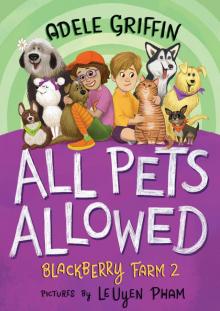 All Pets Allowed
All Pets Allowed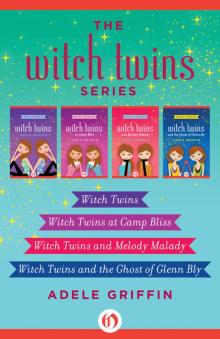 Witch Twins Series
Witch Twins Series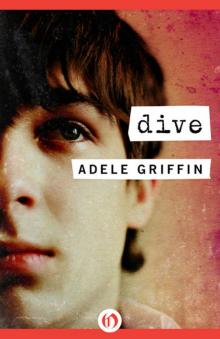 Dive
Dive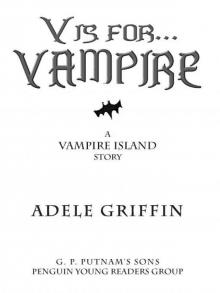 V is for...Vampire
V is for...Vampire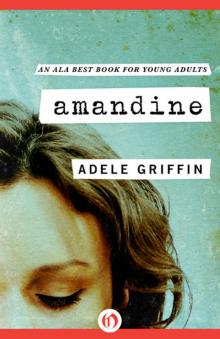 Amandine
Amandine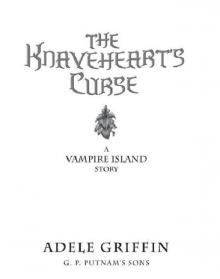 The Knaveheart's Curse
The Knaveheart's Curse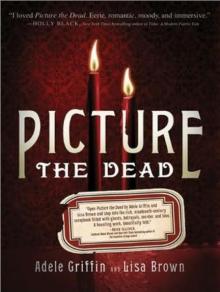 Picture the Dead
Picture the Dead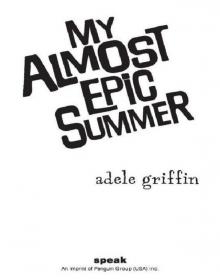 My Almost Epic Summer
My Almost Epic Summer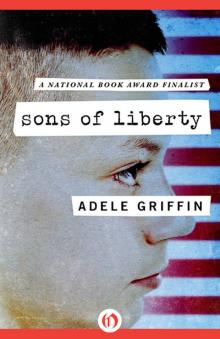 Sons of Liberty
Sons of Liberty Overnight
Overnight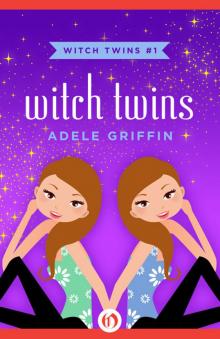 Witch Twins
Witch Twins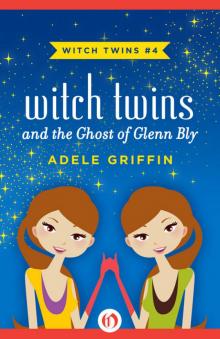 Witch Twins and the Ghost of Glenn Bly
Witch Twins and the Ghost of Glenn Bly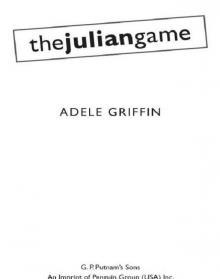 The Julian Game
The Julian Game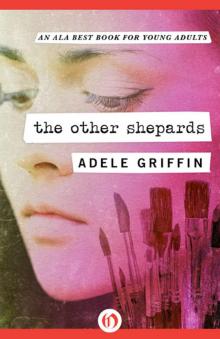 Other Shepards
Other Shepards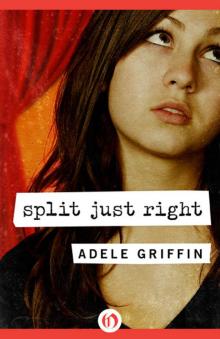 Split Just Right
Split Just Right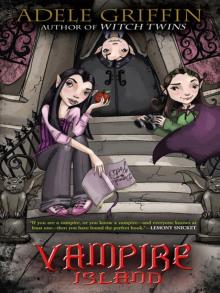 Vampire Island
Vampire Island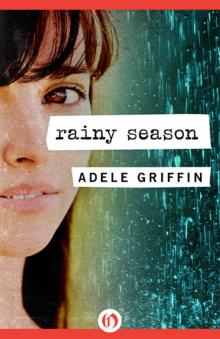 Rainy Season
Rainy Season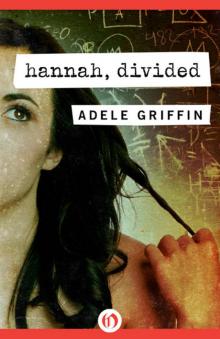 Hannah, Divided
Hannah, Divided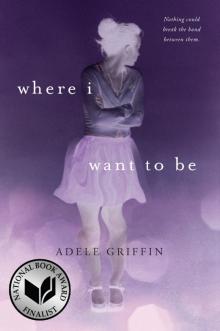 Where I Want to Be
Where I Want to Be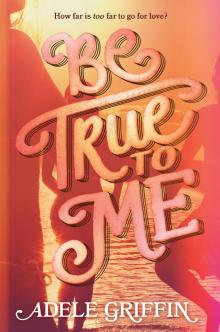 Be True to Me
Be True to Me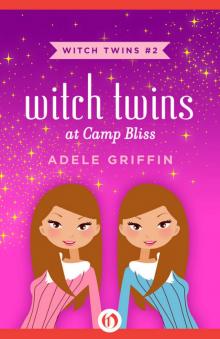 Witch Twins at Camp Bliss
Witch Twins at Camp Bliss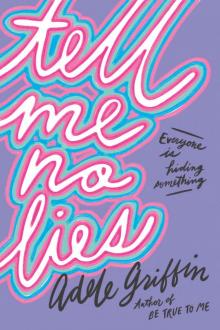 Tell Me No Lies
Tell Me No Lies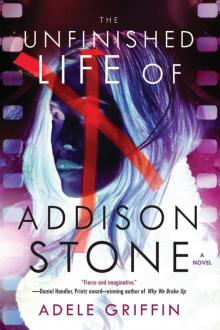 The Unfinished Life of Addison Stone
The Unfinished Life of Addison Stone